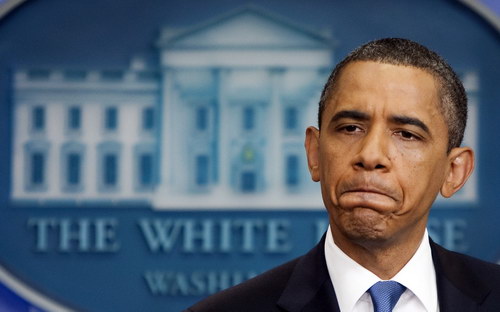Money
Dagong is likely to downgrade US rating
Updated: 2011-07-13 09:36
By Wei Tian (China Daily)
Debt limit aside, borrowing to pay off loans won't work, agency says
BEIJING - The US' sovereign credit rating is likely to be downgraded regardless of whether the US Congress reaches an agreement on raising its statutory debt limit, Chinese rating agency, Dagong Global Rating Co Ltd, said on Monday.
"If the debt limit is raised and the public debt continues to grow, it will further damage the US' debt-paying ability, which is a key factor in Dagong's evaluation, and we will consider lowering its ratings accordingly," said Guan Jianzhong, chairman and CEO of Dagong.
 |
|
US President Barack Obama said on Monday that he will press Congress for "the largest possible deal" on significant deficit cuts. Chinese rating agency Dagong said it may downgrade the US sovereign credit rating, no matter whether any agreement on raising the debt limit is achieved or not. [Photo/Agencies] |
"If the raised limit fails to pass and the US faces default, the rating will be immediately and substantially downgraded," he said.
According to Guan, the downgrading is really just "a matter of time and extent".
Guan spoke after the US Treasury Department warned that the nation will exhaust its borrowing authority under the $14.29 trillion debt limit on Aug 2 and urged Congress to raise the statutory debt limit "to avoid the catastrophic economic and market consequences of a default crisis".
The three major international rating agencies, Moody's Investors Service Inc, Fitch Inc and Standard & Poor's Financial Services LLC (S&P) each warned in June that they would downgrade the US sovereign credit rating in the event of a default.
The country's rating now stands at A+ in domestic and foreign currency on Dagong's list, with negative outlooks to its future, much lower than the result of the US rating agencies.
Dagong's rating was downgraded from AA on Nov 9 after the US government announced a second round of quantitative easing (QE2).
Dagong published its first sovereign credit ratings in July 2010 and now offers surveillance ratings of 67 countries.
The US Securities and Exchange Commission denied Dagong's application for Nationally Recognized Statistical Rating Organization (NRSRO) status because it is not able to implement cross-border supervision to the agency.
Although Guan considers the US Congress still very likely to reach an agreement on raising the debt limit, he remains concerned about the fundamental issue the US faces.
"Raising the limit is just a legislative measure to allow the government to borrow more money, but it does not change the fact that the US lacks momentum for economic growth," Guan said, adding that if the inflation and unemployment rates remain unchanged, the US government might turn to QE3.
The fundamental problem is that the US' ability to generate wealth is far from compensating its increasing debt, and "paying debts by borrowing more is not a solution," he said.
"Neither the $2 trillion QE nor raising the debt limit is an effective measure. And the sovereign debt crisis will continue," Guan said, explaining that the US government spent huge amounts on consumption and social security, and had limited resources left for economic development.
Yuan Gangming, a researcher at the Center for China in the World Economy (CCWE) at Tsinghua University, said the US government is currently in an abnormal post-crisis period, so increasing the scale of debt will be a long-term and regular measure before the country's economy is back on track.
So raising the debt limit would be good news for investors, but bad for China, the largest holder of US Treasury securities, he said.
"Although reducing US Treasury holdings seems like a choice, China will have to continue its investment, because, after all, we have very limited choices of investment," Yuan said.
David Dollar, the US Treasury Department's Economic and Financial Emissary to China, believed the market of the US treasury securities is still optimistic. But the social security and military spending have to be taken into account if the government is to reduce the deficit.
The top 15 debtor nations, all of which are developed countries, account for more that 90 percent of the credit resources globally, yet only contributed 3 percent to global economic growth the year before the 2008 crisis.

Specials

90th anniversary of the CPC
The Party has been leading the country and people to prosperity.

The write stuff
'Pen capital' goes back to drawing board for answers to economic changes taking shape in Zhejiang

Say hello to hi panda
An unusual panda is the rising star in Europe's fashion circles